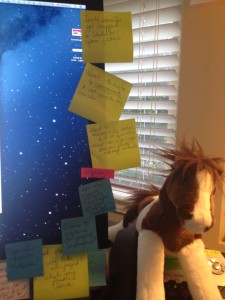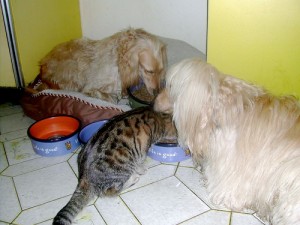Just this week I’ve started a conscious experiment with a really easy boost practice: “Eating Their Dogfood”.
Normally, I just go ahead and stick my nose into other people’s businesses. But this time, I’m being more deliberate.
I’ve asked my students to use a social collaboration tool that’s in beta, and I’ve been tracking our experience and feeding it back to the tool’s developers. I’m so happy to have a tool like this — for free– that I’ll put a little extra work into making the tool better.
(I’m also asking the students to try a new tool so that they shake up their team routines. Experimenting with a new tool is part of our “Hack – Play – Learn” process.)
What is “Eating Dog Food”?
“Eating Your Own Dog Food” is jargon for “using your own product”. The term comes from the world of software startups, where developers are challenged to actually use the tools that they are building so that they can see- in real time- how well those tools actually work.
“Dogfooding”, in its active form, is a way of testing for bugs, for evaluating ease of use, and for suggesting additional features to add to the product’s usefulness.
Eating Their Dog Food takes “dog fooding” a step further.
Instead of using your own product as a way to test it out, you offer to use someone else’s product. Just try out a product that be useful for your business.
Then, make this practice “boosty” by eating their dog food and then sharing what you discover about the product back with the company.
How Do You Eat Some Other Company’s Dog Food?
1. Find something that looks really tasty. Before you even start noshing, find products or companies that actually matter to you and your company. They might help you with a process, add a function to your own product, or support values that align with your company’s purpose.
For my class, I want to nudge the students to converse with each other, learn together, and keep sources coordinated. I want them to do this through a process that centers on their small teams, makes it easy for me to share to all teams at once, and is open to me and the rest of the class. Also, I’d like it to be student centered rather than completely hierarchical (I’m talking to you, Moodle).
The world is your dog food buffet, and you should choose wisely since you can’t eat everything and still get your own work done.
Once you’ve identified a product and company that matter to you:

2. Act like a beta tester. Act like a person/company who’s been formally invited to use a new product and to offer feedback. There’s great advice out there on who to be a good beta tester of video games or fancy software, and all of these recommendations apply to beta testing other products too. In this case you’re a beta “taster”. Your goal is not to break the product, but to experience and savor it.
3.Take notes like an ethnographer. Keep track of what trips you up AND keep track of works well. Keep notes about your experiences (see my post-it examples on my monitor?). Take note of what you like and what you want. Pay attention to where you stumble, and consider why you stumbled.
4. Send compliments to the chefs. Share the information back with the company, in a constructive and connective way.
But Are They Open to Sharing Their Dog Food?
Not all puppies want to share their dog food. However, if the product is being launched by a startup (especially one using Lean StartUp Methods) you can feel pretty confident that they are open to your feedback. A Lean Startup is sending its product out in a minimum viable form just hoping they can tempt you to nosh on it, and tell them what you like.

More formally, companies often search for beta testers through a defined process. When they do, you know that they’re not only open to getting feedback on how to improve their products, but might even have a process for incorporating it.
Companies also display their interest in feedback with tools and tabs like the F.A.Q. and the “Help” feature. When a help feature has an open form, you can put any ideas in there and send it to the company!
Eating Their Dog Food Boosts Everyone
It Boosts Their Company: They get feedback from users who care, in a manner that makes the feedback easy to digest. Then, they can make a better product.
Sometimes beta testers/ dog food noshers help to transform products by giving companies surprising insights into what users really need (rather than what the company assumed). (Hello Daily Muse, content site that’s morphing into a job finding/ management education resource.)
It Boosts Your Company: You get to offer feedback that, if used, makes the product more valuable to you.
Your company gets to practice asking for what you need when you give feedback that identifies what works, what needs help, and what’s needed next. This can build your capacity to understand your own processes as you examine what you still need and why.
However well the tool actually works, you’re the first ones in the door and the first to benefit from it. It boosts your capacity.
It Boosts the Community. A better product or service helps everyone who uses that service.
Will it blend? Can Sharing Dog Food boost your relationship?

There’s a chance that Eating Their Dog Food might also lead to a b2b partnership. You’re offering to engage in a constructive, mutually beneficial relationship with the company, and this might grow beyond the initial supplier/user roles into something more.
At the very least, it puts your company on their radar screen and helps them think of businesses like yours as they conceptualize their desired user community.
Every dessert should come with two forks, one for you and one to offer someone else.
But even when the invitation isn’t explicit, your company can sneak its snout over to that other company’s bowl, take a bit, and tell them what you think.
Offer to Eat Their Dog Food, and while you’re at it, offer them a taste of yours.
See also:
Scale Positive Behaviors by Designing Them Into Social Software Every dessert should come with two forks, to make sharing the ‘default’ behavior.
How to Choose Business Partners for a Boost Economy. Choose to work with organizations and people who are generous and open themselves.
And: Eat Someone Else’s Dog Food, by Cindy Alvarez
Images:
Foodz ![]()
![]()
![]() Some rights reserved by delgrosso
Some rights reserved by delgrosso
Moki Guarding Her Food ![]()
![]()
![]() Some rights reserved by Brian E. Ford
Some rights reserved by Brian E. Ford
‘Scuse Me ![]() Some rights reserved by snuzzy
Some rights reserved by snuzzy

 I am an organizational consultant, change advocate, and organizational identity/reputation scholar with a PhD in leadership & organizations. I research, write about, and consult with organizations on the relationships between organizational identity, actions, and purpose. I teach Technology Management, part-time, at Stevens Institute of Technology.
My current research focuses on how social technologies in the workplace can drive organizational change, generate meaning, and catalyze purpose. See the
I am an organizational consultant, change advocate, and organizational identity/reputation scholar with a PhD in leadership & organizations. I research, write about, and consult with organizations on the relationships between organizational identity, actions, and purpose. I teach Technology Management, part-time, at Stevens Institute of Technology.
My current research focuses on how social technologies in the workplace can drive organizational change, generate meaning, and catalyze purpose. See the 
Comments on this entry are closed.